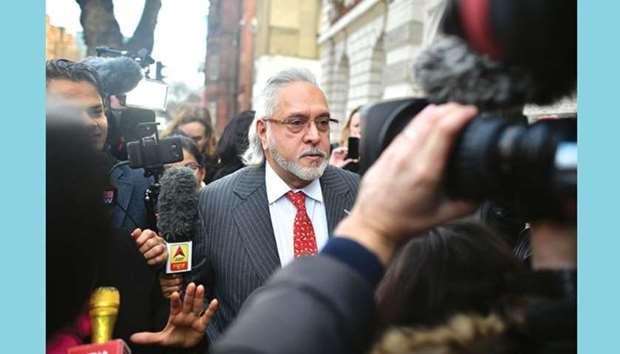A British court yesterday ruled beleaguered industrialist Vijay Mallya can be extradited to India to face fraud charges resulting from the collapse of his defunct Kingfisher Airlines.
India wants to bring criminal action against Mallya, 62, whose business interests have ranged from aviation to liquor, over $1.4bn in loans Kingfisher took out from Indian banks which the authorities argue he had no intention of repaying.
Mallya, who co-owned the Formula One motor racing team Force India until it went into administration in July, has denied any wrongdoing and says the case against him is politically motivated.
He declined to make any comment as he left the court room yesterday.
Judge Emma Arbuthnot, England’s chief magistrate, decided there was a prima facie case against Mallya, who moved to Britain in March 2016, and that his human rights would not be infringed if he were extradited.
Her ruling must be approved by Britain’s interior minister.
Arbuthnot said false representations had been made to the banks, which include state-owned IBDI, regarding what the loans would be used for and she ruled there was evidence of conspiracy to defraud the lenders and of money laundering.
The judge said there had been a catalogue of failings by the banks themselves to carry out proper checks and to ensure guarantees were viable.
But she said there was little evidence that senior IBDI officials themselves were involved in planning to defraud their own bank.
Arbuthnot said executives may have been in “the thrall of this glamorous, flashy, famous, bejewelled, bodyguarded, ostensibly billionaire playboy who charmed and cajoled” them into ignoring their own rules and regulations.
Arbuthnot said Mallya, nicknamed “the King of Good Times” after the slogan of one of his premium beers and his hard partying lifestyle, had used the loans, among other things, for “vanity projects” such as Force India which had received payments at a time when it was struggling in 2010.
“I have found that on the face of it, (Mallya) was doing everything he could by using honest or dishonest means to keep the company going,” she told Westminster Magistrates’ Court.
Mallya said in July that he had made an “unconditional offer” to an Indian court in a bid to settle the charges, but denies that was an admission of guilt.
“I cannot understand how my extradition decision and my settlement offer are linked in any way,” he wrote on Twitter on Thursday.
“Wherever I am physically, my appeal is ‘please take the money’. I want to stop the narrative that I stole money,” he added.
An extradition would be a huge win for Prime Minister Narendra Modi months before an election, after opposition parties said the government had given a “free passage” to Mallya to flee, an accusation it denies.
Modi has faced pressure from political opponents to bring to justice several people who have fled India in recent years to escape prosecution in an array of cases, many of them loan defaults.
Yesterday’s ruling is unlikely to be the end of the long-running case.
Mallya, who was arrested by British police in April 2017, can appeal Arbuthnot’s decision within 14 days to London’s High Court.
The interior minister’s decision can also be appealed to the High Court and ultimately the Supreme Court.
The Indian government said Kingfisher took out a series of loans from Indian banks, in particular IDBI, with the aim of palming off huge losses which Mallya knew the failing airline was going to sustain.

Vijay Mallya arrives to attend a hearing at Westminster Magistrates Court in central London yesterday.
